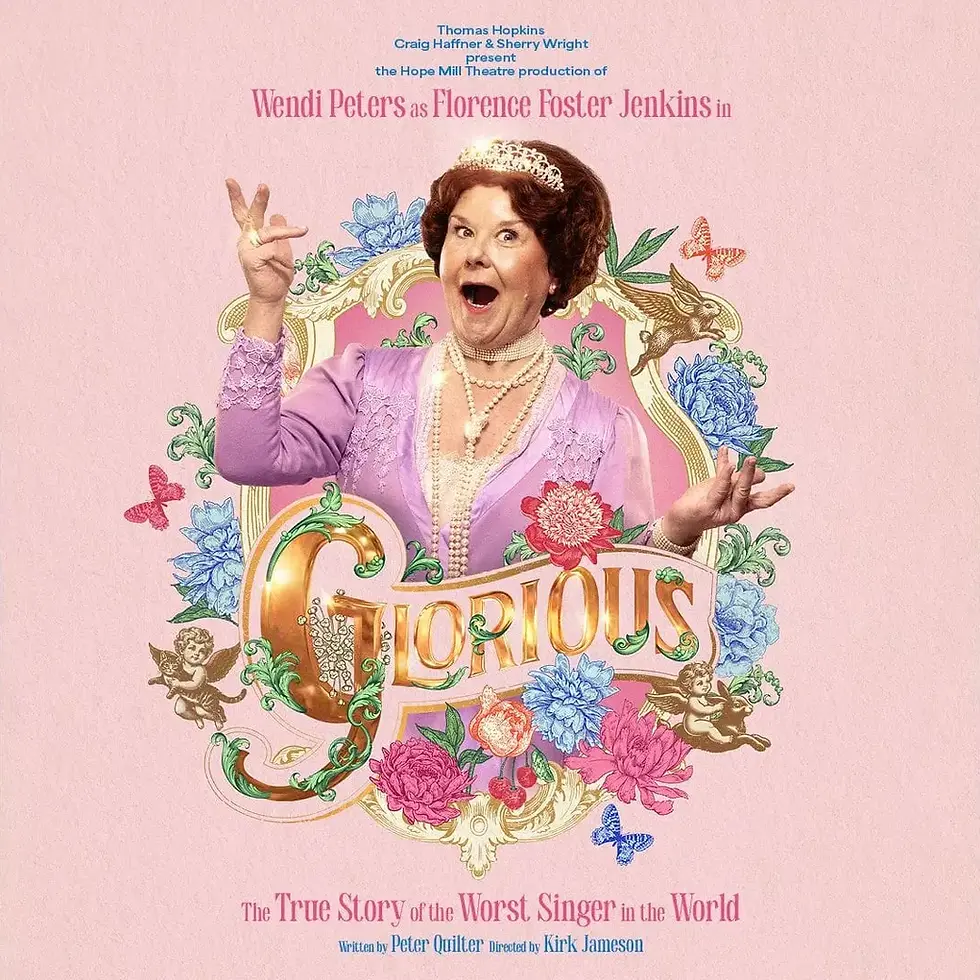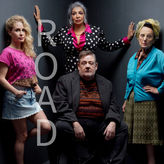Here & Now - UK Tour Review
- Thomas Levi

- Nov 11, 2025
- 5 min read
Updated: Nov 12, 2025
★★★☆☆
If you’ve ever found yourself doing the Tragedy dance in your kitchen, harmonising to One for Sorrow, or secretly believe that glitter counts as an accessory, then Here & Now: The Steps Musical is the night out you’ve been waiting for. But is it trying too hard to be heartfelt that it doesn’t realise it’s full of camp anthems?

Set on a Friday night in the neon-lit aisles of Better Best Bargains, a seaside superstore where four inseparable friends embark on a pact for a “summer of love”. Caz celebrates her adoption approval, Vel contemplates freeing herself from a stale relationship, Neeta wrestles with love and confession, and Robbie’s casual hook-up era collides with something more meaningful. Toss in a scramble of betrayal, a drag queen and a megamix finale, and you’ve got a show that pairs buttery pop nostalgia with weird, winding emotional arcs.
I first saw it in previews a year ago, when it felt like a promising but slightly confused experiment, torn between being a heartfelt and a B-movie pop concert. There have been very few changes to the UK tour. Here & Now remains a gloriously camp celebration of one of Britain’s most iconic pop groups. The rough edges remain — the shoe-horned songs and the paper-thin plot with too much going on — but it’s impossible not to grin at the tongue-in-cheek moments, whilst grimacing at the attempts at drama. But, at the end of the day, has anyone really come to a Steps musical for subtlety and narrative depth?
Visually, Here & Now remains a feast for the senses; a dazzling blur of neon lights, glitter, and unapologetic ’90s pop nostalgia. The set glows with the same high-octane energy that defined Steps’ heyday: bold colours, relentless choreography, and enough sparkle to light up an arena. At times, the supermarket setting feels more like a glammed-up spin class than a retail space, but that’s part of its chaotic charm. The production practically dares the audience to sing, clap, and dance along, which perhaps explains the gloriously overextended, post-bow megamix that closes the show. What’s most notable, though, is the audience expectations of the show: gone are the Steps super-fans singing along to every number, replaced by a sea of theatre goers who are both baffled and amazed in equal measures.

The vocals are, unsurprisingly, everything fans could hope for — big, bright, and bursting with those signature harmonies that made Steps one of Britain’s most instantly recognisable pop acts. While a few voices naturally shine brighter, the overall vocal quality across the cast is consistently good. And where there’s a Steps song, there’s a dance routine — choreographer Matt Cole ensures that almost every scene bursts into an infectious, high-energy sequence that feels part concert, part glitter-fuelled fever dream, but not always necessarily needed. The visual spectacle is completed by Gabriella Slade’s costume design, which leans unapologetically into the group’s trademark flamboyance: bold colours, bucketloads of sequins, and outfits that scream pop perfection.
Lara Denning brings to life Caz with a poised blend of longing and strength. From the moment she appears, Denning conveys Caz’s carefully constructed façade with crisp vocals and measured poise. Her renditions of “One for Sorrow” hit with real clarity, and her quieter moments reveal a vulnerability that earns the audience’s trust. Dean Rickards’s Robbie is the kind of character who glows with energy, but the performance cleverly hints at deeper undercurrents. It is often hit-or-miss when the understudy steps on stage, but Rickards plays the “boy-next-door” with charm, and doesn’t shy away from Robbie’s complexity: the abandonment, the need for connection, the fear of failing.
River Medway’s Jem is a lot of fun. Their performance of “Chain Reaction” is one of the show’s more flamboyant moments. What Medway does so well is anchor the drag-queen persona with sincerity—you believe in the character’s joie de vivre and their hidden fractures at once. Jacqui Dubois carries Vel’s weariness with nuance in the early scenes, then gradually lets the character bloom into new possibilities. Dubois’s comic timing is steady, especially in moments of small rebellion and reckoning. Unfortunately she opts for a subtle, sedated performance that does not match the over-acted, high-spirited energy of the rest of the cast, leaving her feelings underwhelming.

Rosie Singha brings warmth and an understated charm to Neeta, grounding the chaos around her with a genuine relatability. Her vocal riffs and character were a pleasure to behold. Finty Williams delights as Patricia, relishing every comic beat with a twinkle that makes her smallest gestures land. Ben Darcy’s Ben is earnest and affable, his awkward sincerity lending heart to the romantic subplot. Lauren Woolf’s Tracey uses a lot of dry humour, but was missing the no-nonsense edge needed for Tracey to cut through the glitter. And John Stacey, as Lesley, finds his moments with an infectious silliness, proving that even the trolley boy can roll away with the laughs.
The script still struggles when placed under closer inspection. The pacing feels uneven, with showstopping numbers flying by, while some emotional scenes linger a little too long, with too much ‘sad acting’. And the way certain songs are wedged into the plot remains as eyebrow-raising as ever; “5, 6, 7, 8” is the prime offender, dropped into a context so bizarre it is physically frustrating and annoying to watch.
The depiction of queer love feels dated. Robbie’s story leans too heavily on tired tropes — the promiscuous gay man with daddy issues who finds redemption through a drag queen. While Tracey’s lesbian stereotypes include, but are not limited to, a heavy-lifting job and butch swagger, which feels overfamiliar. It’s not that these performances lack authenticity; Dean Rickards and Lauren Woolf bring sincerity, warmth, and emotional depth to their roles, but the writing doesn’t quite trust them to exist beyond the clichés. A few of these character choices might, ironically, have been “Better Best Forgotten.”
In short, Here & Now needs to acknowledge its identity and leans into it. Worry less about pretending to be a gritty drama and be more intent on delivering maximal pop joy; a show that feels like the musical equivalent of putting on your favourite hits and dancing in your kitchen. It carries the familiar faults of the jukebox format (songs shoe-horned, story bent to fit), but by choosing to celebrate those faults, the production can turn them into charms. For fans of Steps, for those who can’t resist a medley of “Better Best Forgotten”, “Stomp”, “Chain Reaction”, and “5, 6, 7, 8”, this is absolutely your glitter-dusted paradise. Casual theatre-goers looking for an emotionally layered narrative might find themselves wanting more, but if the aim is fun, nostalgia, and an evening of hits, you’re in the right aisle.

The UK tour of Here & Now: The Steps Musical, you’ll walk out humming, you’ll probably perform choreography you didn’t know you remembered, and you’ll leave with a smile. If you love the music, go buy tickets. If you’re hoping for a deep thesis on love and betrayal, you have wandered into the wrong supermarket. Either way, bring your dancing shoes and maybe a pineapple prop for full effect.
















































Comments